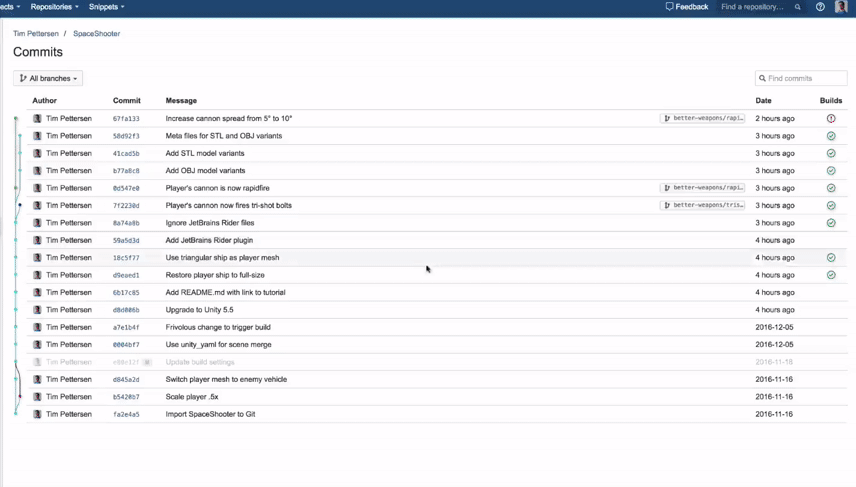The Bitbucket team are excited to announce a brand new integration with Unity Cloud Build, just in time for GDC 2017!
Traditionally, game builds are compiled, tested, and packaged by developers via their IDE or another tool provided by the game engine SDK. This is sub-optimal as it wastes developer time and resources, excludes non-technical contributors from building the game, and requires builds to be uploaded and hosted somewhere to share with other team members. The situation is even worse if you target multiple platforms with your game, as you’ll need to create separate builds for each platform.
Fortunately, Unity Cloud Build provides automated builds and continuous integration for your Unity projects hosted on Bitbucket. Bitbucket’s new Unity Cloud Build integration improves this experience by allowing you to jump quickly from your source code in Bitbucket to a built, playable version of your game or app.

Once the integration is enabled, Unity build logs and artifacts are posted to Bitbucket as build statuses, so you can jump from your source code in Bitbucket to a playable version of that same code with a single click. The integration automatically creates a sharable link for each game artifact, allowing any team member to access builds for the latest version or historical versions of their game – without having to wait for a developer to cut a build for them.
Your project, your platforms
Unity Cloud Build supports a range of target platforms including Android and iOS games and apps, desktop games for Windows, macOS, and Linux, and WebGL builds for the web! In fact, for WebGL builds, you can click straight from your code in Bitbucket to an interactive web player and play your game without having to download a build yourself.
- get the very latest version of your project by clicking the build at the tip of your master branch;
- play code changes while you review them, by clicking on the latest pull request build; or
- check whether an earlier version of your game exhibits a particular bug, by clicking a build on a historical commit!
If a build happens to fail, no game artifacts are generated, but a handy link to the build logs will be displayed instead so you can quickly debug the failure and get your project building again. Speaking of failed builds, Unity Cloud Build statuses are fully integrated with Bitbucket’s merge checks which can be optionally enabled to prevent failing code from being merged into master, keeping your game buildable at all times.
Getting started
Setting up Unity Cloud Build and Bitbucket integration is easy! Simply:
- Sign up for Bitbucket (if you haven’t already)
- Follow Unity’s excellent tutorial on Creating your First Cloud Build Project
- Enable Unity Cloud Build integration in Bitbucket
Once enabled, you’ll start seeing build statuses appearing after each build completes in Unity Cloud Build.
We’re at GDC 2017!
The Bitbucket and SourceTree team will be representing at GDC in force! If you want to catch a demo of the Unity Cloud Build integration, score some Atlassian swag, or have any questions about our game development tools: come and find us at Booth #336, South Hall Zone 2.
I’ll also be giving a talk – Collaborating on Unity Projects with Git – at 4pm in Room 3014, West Hall. It’ll feature the new Unity Cloud Build integration, alongside some tips for versioning Unity projects in Git, handling large assets with Git LFS, and Git workflows for game dev teams. Looking forward to seeing you there!

